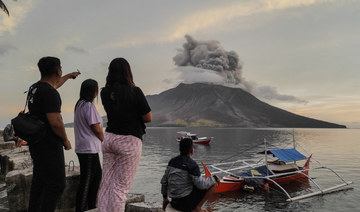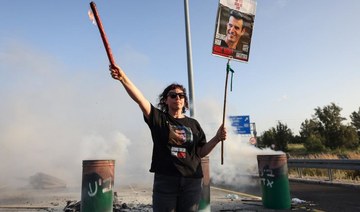KARACHI: Police in Pakistan say the use of digital currencies, including bitcoin, for international terror financing, as well as crimes such as extortion and ransom, is on the rise as authorities move to crack down on illegal methods of money transfer.
Bitcoin is the most common virtual currency and is used as a vehicle for moving money around the world quickly and anonymously via the web without the need for third-party verification.
Militant groups worldwide, including Daesh, are increasingly calling on supporters to donate using the digital currency.
Pakistan recently moved to meet 27 targets set for it in 2018 when the South Asian nation was placed on a Financial Action Task Force (FATF) “grey list” of countries with inadequate controls over terror financing. The task force has urged Pakistan to complete an internationally agreed action plan by February 2021. The next virtual plenary of the task force is scheduled for February 22-25.
“We are seeing this trend (of using bitcoin for crimes) since we tightened the noose around illegal systems of transferring funds,” Raja Umar Khattab, head of the Transnational Terrorists Intelligence Group in Sindh’s counterterrorism police, told Arab News.
Last month, Khattab arrested Hafiz Muhammad Omar bin Khalid, a Pakistani engineering student charged with sending bitcoin donations to militants in Syria.
Khalid had transferred over Rs.1 million ($6,200) when he was caught, according to Omar Shahid Hamid, counterterrorism department (CTD) deputy inspector general.
The student had also previously been arrested, and released, in 2018 for extending financial support to an Al-Qaeda militant in Afghanistan, officials said.
In December 2019, Khalid came across a Telegram account online that guided him on how to help the widows of Daesh militants in Syria.
“Help jihadis and their families by sending money through bitcoin,” said one user on the Telegram group, leading Khalid down a rabbit hole of searches into bitcoin wallets. That, in turn, led him to an associate named Zia Shaikh Turk, based in Hyderabad, who converted cash into bitcoin and sent it off to “jihadi brides” in Syria, according to Hamid.
The Pakistani widow of a militant, whom Khalid identified as Umm-e-Bilal, also asked him to open a mobile wallet account, according to interrogation reports made available to Arab News.
“Umm-e-Bilal asked me to open an EasyPaisa (Pakistani digital payment system) account as some of her acquaintances hadn’t heard of bitcoins, but wanted to contribute,” one intelligence report said, quoting Khalid. “I got Rs. 450,000 into my account, added another Rs. 100,000 of my own, converted them into bitcoin and sent them to Syria.”
Last year, a US citizen of Pakistan origin, Zoobia Shahnaz, was sentenced to 13 years’ imprisonment for providing material support to foreign militant organizations, specifically more than $150,000 to Daesh.
Shahnaz, 27, from Long Island, admitted to wiring more than $150,000 to individuals and shell entities that were fronts for Daesh in Pakistan, China and Turkey in 2017. She was engaged in a scheme to scam Chase Bank, TD Bank, American Express and Discover by fraudulently obtaining six credit cards, according to a court filing. She then bought more than $62,703 in bitcoin and other cryptocurrencies, and converted them into cash.
An official at the Federal Investigation Agency (FIA) told Arab News the unit had received numerous complaints in recent months by victims asked to pay ransom and extortion in the form of bitcoin. The official did not go on the record as he was not authorized to discuss the cases with the media.
“Cryptocurrency has been used in international as well as local cases of extortion, kidnapping for ransom, harassment and money laundering as there is no centralized monitoring system,” the official said.
In December, a female student in Karachi was blackmailed by an unknown sender who had uploaded her private photos to a pornographic website and demanded Rs. 3 million in bitcoin to remove them. The FIA traced the case to a man in an African country who had hacked the girl’s Snapchat account and eventually taken control of her phone. The alleged blackmailer has since removed the pictures himself.
In another case, a truck contractor in Karachi told Arab News he got a call from an Afghanistan number by a man who knew where he lived and had intricate details of his family’s movements. The man demanded extortion money in bitcoin or else his family would be harmed. The trader declined to be named out of fear for his family’s safety, but said he eventually paid the money using digital currency.
Such cases have led to calls for a ban on virtual currencies in Pakistan, while advocates for regulation have also become more active.
Last month, Rehan Masood, a lawyer for the Pakistani central bank, told the Sindh High Court the state bank had issued a warning about dealing in cryptocurrencies but not banned them.
Pakistan’s central bank issued a circular dated April 6, 2018, advising financial institutions, including banks and payment service providers, “to refrain from processing, using, trading, holding, transferring value, promoting and investing in virtual currencies/tokens.”
The circular said financial institutions “will not facilitate their customers/account holders to transact in VCs/ICO tokens. Any transaction in this regard shall immediately be reported to (the) Financial Monitoring Unit (FMU) as a suspicious transaction.”
TV host Waqar Zaka, an advocate for allowing cryptocurrency in Pakistan, who last January filed a court case against the FIA for arresting people for possessing bitcoin, described trading in virtual currencies as a fundamental right.
“Any ban will deprive Pakistanis of earning the biggest profits,” Zaka told Arab News. “The top countries on FATF have been dealing in cryptocurrency because they know that bitcoin doesn’t work without the Internet, which has a digital trace.”
Independent blockchain and cryptocurrency expert Hassan Raza agreed, saying a complete ban on blockchain-based payment networks should be “out of the question.”
“Terror financing is also done via the banking system, but those have not been banned,” he said, adding that the government should regulate digital tokens.
“Since every transaction in a public blockchain network like bitcoin is stored in a permanent and immutable distributed, public database, anyone is free to view them and conduct data analysis of any complexity on them,” Raza said.
“In fact, several people allegedly involved in illegal activity have been caught in this very manner.”
Crypto terror: Pakistan warns of digital currency crime spike
https://arab.news/6s6fg
Crypto terror: Pakistan warns of digital currency crime spike

- Militants push supporters to donate through bitcoin, police say amid crackdown
- Bitcoin is the most common virtual currency and is used as a vehicle for moving money around the world quickly and anonymously
Philippine bishops instruct flock to pray for rain, heat relief

- Rising temperatures have forced the government to shut down tens of thousands of schools over the past week
- Increased demand has also stressed the country’s already strained power supply
MANILA: Catholic bishops in the Philippines are pitching in to seek divine relief from the extreme heatwave scorching the country, instructing their flock to recite special prayers for rain and lower temperatures.
Rising temperatures have forced the government to shut down tens of thousands of schools over the past week, while increased demand has stressed the country’s already strained power supply.
A widespread El Nino drought that began early this year is compounding the problem, ruining 5.9 billion pesos ($103 million) worth of farm produce so far according to the Department of Agriculture.
The Catholic Bishops Conference of the Philippines issued an “Oratio Imperata,” instructing parishes in the mainly Catholic nation to recite a prayer for deliverance from calamities during masses, according to the text seen by AFP on Saturday.
“We humbly ask you to grant us relief from the extreme heat that besets your people at this time, disrupting their activities and threatening their lives and livelihood,” the prayer read.
“Send us rain to replenish our depleting water sources, to irrigate our fields, to stave off water and power shortages and to provide water for our daily needs.”
A record-high 38.8 degrees Celsius (101.8 degrees Fahrenheit) was recorded in the capital Manila on April 27, forcing the closure of more than 47,000 schools for two days.
Nearly 8,000 schools remained shuttered as of Friday, the education department said, while the highest temperature in the country was recorded at 38.2C on the island of Mindoro south of the capital.
Indonesia to permanently relocate 10,000 people after Ruang volcano eruptions
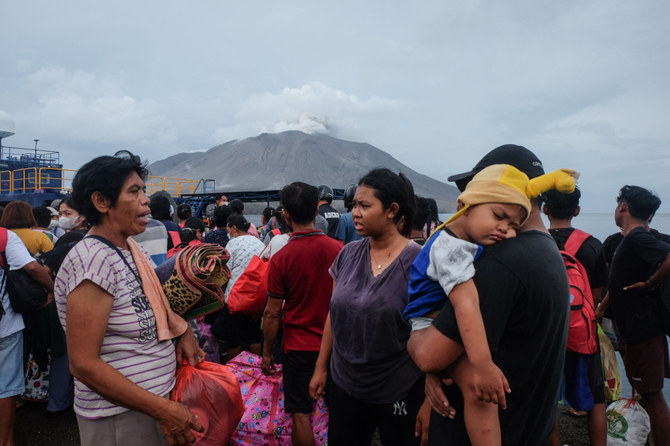
- Authorities warned of the a possible tsunami if parts of the mountain collapse into the surrounding waters
- Indonesia straddles the “Pacific Ring of Fire,” an area of high seismic activity where multiple tectonic plates meet
JAKARTA: The Indonesian government will permanently relocate almost 10,000 residents after a series of explosive eruptions of the Ruang volcano has raised concerns about the dangers of residing on the island in future, a minister said on Friday.
About 9,800 people live on Ruang island, in the province of North Sulawesi, but in recent weeks all residents have been forced to evacuate after the mountain has continued to spew incandescent lava and columns of ash kilometers into the sky.
Authorities this week raised the alert status of the volcano to the highest level, closed the provincial airport in Manado, and also warned of the a possible tsunami if parts of the mountain collapse into the surrounding waters.

Hundreds of “simple but permanent” homes would be built in the Bolaang Mongondow area to facilitate the relocations, said coordinating human development minister Muhadjir Effendy, after a cabinet meeting to discuss the volcano on Friday.
“As instructed by President Joko Widodo, we will build houses that meet disaster-standards,” he said, adding that the site was located about 200 km (125 miles) from Ruang island.
Mount Ruang began to dramatically erupt last month, with experts saying the eruptions were triggered by increased seismic activity, including deep sea earthquakes.
The mountain erupted again on Tuesday, causing damage to some homes and forcing residents to evacuate from the Tagulandang island, where they had initially sought refuge, to the provincial capital of Manado.
Roads and buildings on Tagulandang were blanketed in a thick layer of volcanic ash, and the roofs of some homes had collapsed, according a Reuters witness.
The volcano had not erupted on Friday but Manado’s Sam Ratulangi Airport remained closed until the evening due to the spread of volcanic ash.
Indonesia straddles the so-called “Pacific Ring of Fire,” an area of high seismic activity where multiple tectonic plates meet.
US congressman praises heckling of war protesters, including 1 who made monkey gestures at Black woman
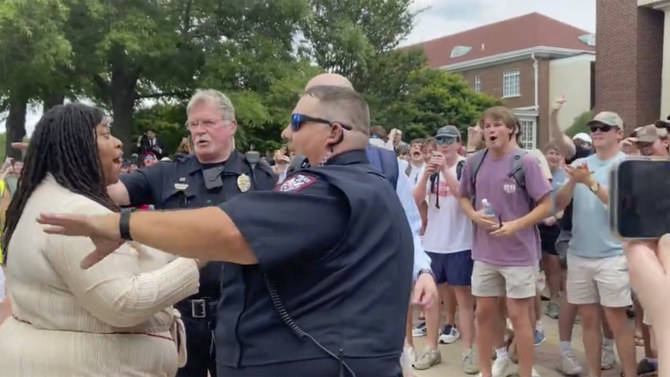
JACKSON, Mississippi: Israel-Hamas war demonstrations at the University of Mississippi turned ugly this week when one counter-protester appeared to make monkey noises and gestures at a Black student in a raucous gathering that was endorsed by a far-right congressman from Georgia.
“Ole Miss taking care of business,” Republican US Rep. Mike Collins wrote Friday on the social platform X with a with a link to the video showing the racist jeers.
The Associated Press left voicemail messages for Collins on Friday at his offices in Georgia and Washington and sent an email to his spokesperson, asking for an explanation of what Collins meant. There was no immediate response.
The taunting brought sharp criticism on and off campus.
“Students were calling for an end to genocide. They were met with racism,” James M. Thomas, a sociology professor at the University of Mississippi, wrote Friday on X.
The Rev. Cornell William Brooks, a former president and CEO of the NAACP and professor at the John F. Kennedy School of Government at Harvard University, wrote on X that a white man mocking a Black woman as a monkey “isn’t about ‘Stand With Israel’ or ‘Free Palestine.’ This is protest as performative racism.”
Collins was first elected to Congress in 2022 and made several social media posts criticizing campus protests.
Nobody was arrested during the demonstration Thursday at the University of Mississippi, where hecklers vastly outnumbered war protesters. According to a count by AP, more than 2,400 arrests have occurred on 46 US university or college campuses since April 17 during demonstrations against the war.
The student newspaper, The Daily Mississippian, reported about 30 protesters on the Oxford campus billed themselves as UMiss for Palestine. Videos and photos from the event showed the protesters were in a grassy area near the main library, blocked off by barriers erected by campus security.
They chanted “Free, free Palestine,” and carried Palestinian flags and signs with slogans including, “Stop the Genocide” and “US bombs take Palestine lives.”
Student journalist Stacey J. Spiehler shot video that showed campus police officers and the dean of students standing between anti-war protesters and hecklers. After the Black woman protesting the war had what appeared to be a heated exchange of words with several white hecklers, one of the men made the monkey gestures and noises at her.
About 76 percent of the university’s students were white and about 11 percent were Black in 2022-23, the most recent data available on the school’s website.
University of Mississippi Chancellor Glenn Boyce said the school is committed to people expressing their views. He said some statements made on campus Thursday were “offensive and unacceptable.”
Republican Gov. Tate Reeves reposted a video on X that showed counter-protesters on the campus singing “The Star-Spangled Banner.”
“Warms my heart,” Reeves wrote. “I love Mississippi!”
US campus protests wane after crackdowns, Biden rebuke
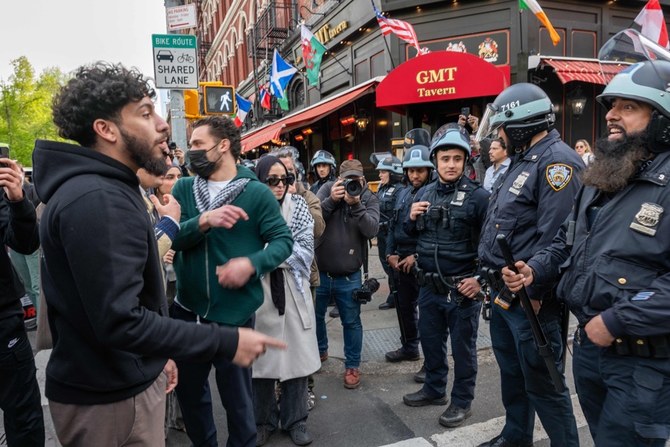
- More than 2,000 arrests have been made in the past two weeks across the US
NEW YORK: Pro-Palestinian protests that have rocked US campuses for weeks were more muted Friday after a series of clashes with police, mass arrests and a stern White House directive to restore order.
Police in Manhattan cleared an encampment at New York University after sunrise, with video posted to social media by an official showing protesters exiting their tents and dispersing when ordered to do so.
The scene appeared relatively calm compared to crackdowns at other campuses around the country — and some worldwide — where protests over Israel’s war against Hamas in Gaza have multiplied in recent weeks.
University administrators, who have tried to balance the right to protest and complaints of violence and hate speech, have increasingly called on police to clear out the demonstrators ahead of year-end exams and graduation ceremonies.
At the University of Chicago, law enforcement appeared set to dismantle an encampment Friday after the school’s president said talks with protesters on a compromise had failed.
Before the clearing operation began, dozens of American flag-wielding counter-protesters showed up and confronted the pro-Palestinian group, but police separated the two sides, local media reported.
More than 2,000 arrests have been made in the past two weeks across the US, some during violent confrontations with police, giving rise to accusations of use of excessive force.
President Joe Biden, who has faced pressure from all political sides over the conflict in Gaza, gave his first expansive remarks on the protests Thursday, saying that “order must prevail.”
“We are not an authoritarian nation where we silence people or squash dissent,” Biden said in a brief address from the White House.
“But neither are we a lawless country. We’re a civil society, and order must prevail.”
His remarks came hours after police moved in on demonstrators at the University of California, Los Angeles, which had seen a violent confrontation when counter-protesters attacked a fortified encampment there.
A large police contingent forcibly cleared the sprawling encampment early Thursday while flashbangs were launched to disperse crowds gathered outside.
Schools officials said that more than 200 people were arrested.
On the US East coast Thursday, protesters at New Jersey’s Rutgers University agreed to take down their camp after reaching a compromise with administrators — a similar deal to one made at Brown University in Rhode Island.
Republicans have accused Biden of being soft on what they say is anti-Semitic sentiment among the protesters, while he faces opposition in his own party for his strong support for Israel’s military offensive.
“There should be no place on any campus, no place in America for anti-Semitism, or threats of violence against Jewish students,” Biden said.
Education Secretary Miguel Cardona echoed the condemnation in a letter to university leaders on Friday, pledging to investigate reports of anti-Semitism “aggressively,” CNN reported.
Meanwhile, similar student protests have popped up in countries around the world, including in Australia, France, Mexico and Canada.
In Paris, police moved in to clear students staging a sit-in at the Sciences Po university.
An encampment has grown at Canada’s prestigious McGill University, where administrators on Wednesday demanded it be taken down “without delay.”
However, police had yet to take action against the site as of Friday.
The Gaza war started when Hamas militants staged an unprecedented attack on Israel on October 7 that resulted in the deaths of more than 1,170 people, mostly civilians, according to an AFP tally of Israeli official figures.
Israel estimates that 128 hostages remain in Gaza. The Israeli military says 35 of them are dead.
Israel’s retaliatory offensive has killed more than 34,600 people in Gaza, mostly women and children, according to the Hamas-run territory’s health ministry.
Biden to host Jordan king next week amid Gaza talks

- Hamas accused Israeli Prime Minister Benjamin Netanyahu on Friday of trying to derail the proposed Gaza deal with his threats to launch an operation in Rafah
- Israel has killed more than 34,000 Palestinians in Gaza, mostly women and children, according to the health ministry in the Hamas-run territory
WASHINGTON: US President Joe Biden will host Jordan’s King Abdullah II next week, the White House said Friday, as negotiations continue in the Middle East for a ceasefire in Gaza.
The meeting will be “private” and will be followed by a readout, White House Press Secretary Karine Jean-Pierre told reporters, without giving a date for the encounter.
The meeting comes against the backdrop of talks for a deal to release hostages and secure a ceasefire between Israel and Hamas in Gaza after nearly seven months of war.
The talks, which come after months of efforts by mediators Egypt, Qatar and the United States to broker a new agreement between the combatants, are at a critical juncture.
The United States has urged the Palestinian militant group to accept the “extraordinarily generous” offer.
But Hamas accused Israeli Prime Minister Benjamin Netanyahu on Friday of trying to derail the proposed Gaza deal with his threats to launch an operation in Rafah.
King Abdullah II last visited the White House in February when he called for an immediate ceasefire and warned an attack on Rafah would cause a “humanitarian catastrophe.”
In April, Jordan worked alongside the United States and other allies to shoot down Iranian drones that Tehran sent toward Israel, with the kingdom keen to avoid a wider conflict.







